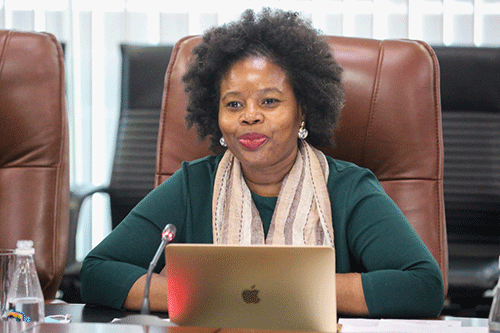Maihapa Ndjavera
Loide Jason
Newly formed indigenous business organisations have voiced their plight, including calls for better treatment and recognition, especially by financial institutions.
Both the Black Business Leadership Network of Namibia (BBLNN) and the Namibia Local Business Association (Naloba) met President Hage Geingob yesterday at State House during separate courtesy calls.
The BBLNN, which was first to meet Geingob, lambasted critics of black empowerment initiatives, and called for the immediate implementation of the National Equitable Economic Empowerment Framework (NEEEF) and the Investment Promotion Bill. BBLNN president Irene Simeon-Kurtz yesterday challenged those opposing the implementation of the initiatives, saying they are on an onslaught against the plight of black businesses in the country. “We are calling for an immediate implementation of the two bills. A person opposing the implementation is a problem to this country, and is sabotaging economic emancipation,” she stated. The BBLNN was formed by a group of previously disadvantaged entrepreneurs from different business sectors. The gist of the NEEEF transformation policy is to serve as a corrective measure of the indisputable socio-economic inequality produced by past discriminatory laws and practices. More aptly, it is to amend the great income disparities that exist in Namibia since independence. Simeon-Kurtz said the aim of the network is to protect black businesses, prevent as many as possible businesses from closing down, and limit the number of job losses in the Namibian economy. In response, Geingob said NEEEF was opposed and condemned by “blacks”. “There was no vocal support from you; where were you?” Geingob further stressed that the concerns raised are relevant to the nation and will be tackled accordingly through different institutions. In outlining the challenges they are facing, Simeon-Kurtz said the level of financial exclusion in terms of access to banking services remains high. According to her, financial exclusion has a negative impact on the economy and results on a high dependency on the state or state resources. Furthermore, there is a spill-over of inequality in Namibia because SMEs continue to experience difficulties in obtaining financing services from commercial banks due to high lending and collateral requirements, which she slammed as discriminatory practices. “Income disparities and distribution remain a challenge for most disadvantaged entrepreneurs, which is a legacy issue. This results in the payment of ‘black tax’ for breadwinners. This is caused by continued economic imbalances that can be traced back to apartheid and slavery,” she pointed out. Simeon-Kurtz said commercial banks are very sensitive to black entrepreneurs as they want 100% guarantees, their repayment ability is often questioned when applying for loans (discriminatory practices), while there’s a low risk appetite on proposed projects and business proposals towards their loan submissions. Furthermore, she touched on the issue of the SME Bank, which is in liquidation, saying loan holders received judgements and execution orders from the bank. “When they miss a payment, they receive an immediate notice of execution. No Covid relief for loan holders of SME Bank, high unaffordable monthly instalments from lawyers and liquidators, double punishment because of legal fees, interest and penalties. Those who had savings and investment accounts with the bank cannot access funds for reasons unknown,” she stated.
Naloba demands protection
Meanwhile, representatives of Naloba want foreign investors to focus on large opportunities that are beyond what the local businesses can produce, for fair competition and job creation among fresh graduates. Naloba is also a newly established business association, open to all local Namibians. It was established to be a voice for business interests and the needs of indigenous business people. Naloba’s vice president Peter Amadhila told Geingob that they want to be recognised as an all- Namibian native business voice and a potent government partner to create employment and wealth. “We want to be engaged in all business-related activities and possible developmental partnerships with government to revive and grow the Namibian economy,” he requested on behalf of the organisation. Amadhila added that the association wants to be engaged for advice through consultations in applicable trade, procurement and natural resources’ policy formulation, with revisions and amendments benefitting the local business community. “We also want to be recognised as potential all-Namibian native business representatives on international business exhibitions and trade-related activities,” he added. On his part, Geingob told the association that unity was vital for economic revival and growth. “I believe in consultation, and I have already instructed ministers and governors to consult business people during this process to resolve the economic problem,” he said. Prime Minister Saara Kuugongelwa-Amadhila told the businessmen to identify all that they can produce against what is being offered by foreign-owned investors before engaging the government for further consideration. “We are going to unpack the issues you have identified for us to understand what it is that you can produce and supply and what you cannot, and reach a practical solution,” she said.


